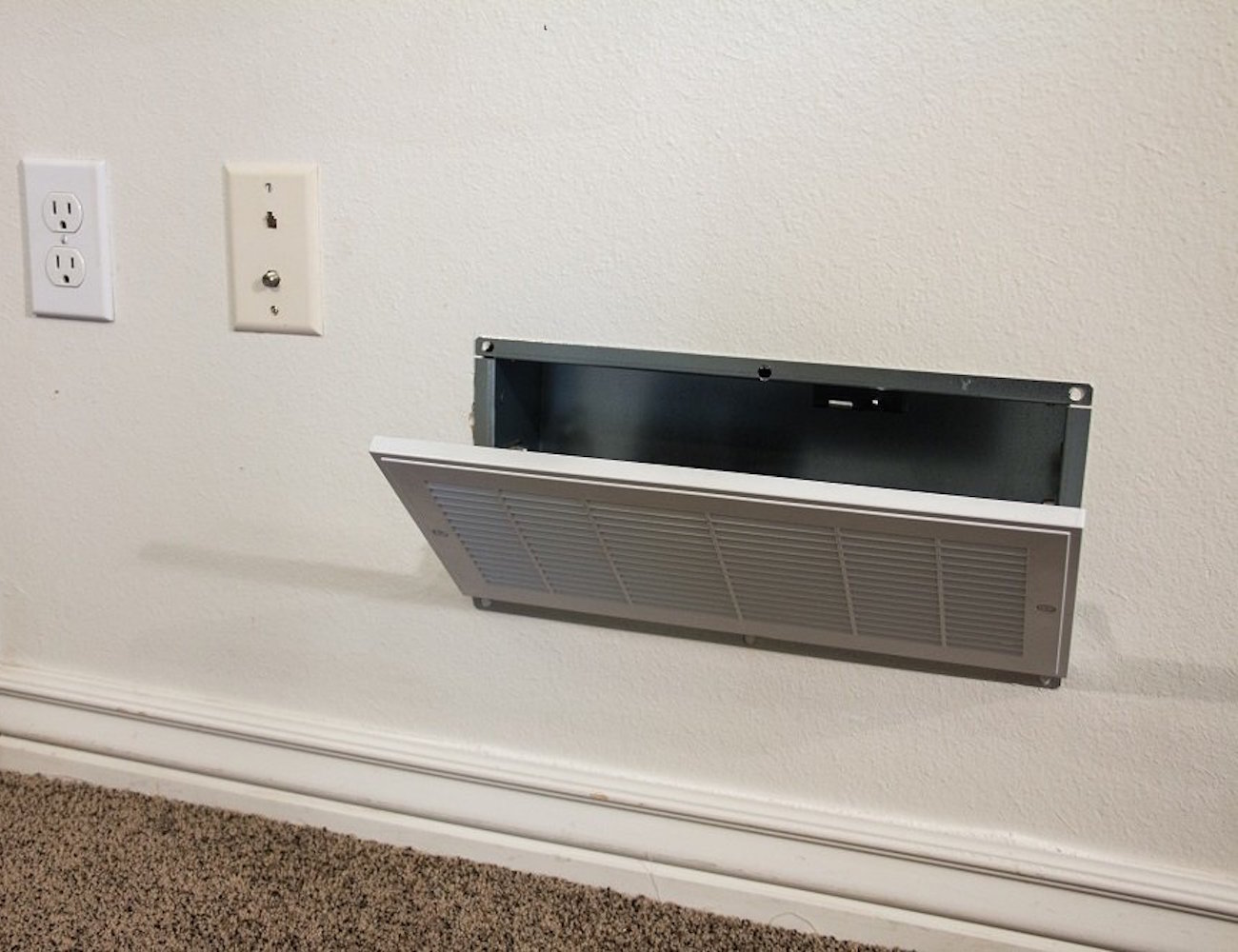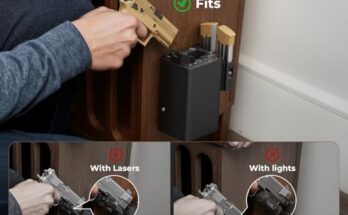Gun safes typically do not have built-in ventilation. This can cause issues like moisture buildup inside the safe.
Gun safes are essential for securing firearms and valuables. They protect against theft, fire, and unauthorized access. Without proper ventilation, moisture can accumulate inside the safe. This can lead to rust and damage to your firearms and other items. To mitigate this, many gun owners use dehumidifiers or desiccants inside their safes.
It’s crucial to maintain a dry environment to ensure the longevity of your stored items. Regularly checking and managing the humidity levels inside your gun safe can prevent potential problems. Proper maintenance ensures that your valuables remain in optimal condition.

Credit: www.thisiswhyimbroke.com
Importance Of Gun Safes
Gun safes are essential for responsible gun owners. They provide a secure place to store firearms. This prevents unauthorized access and potential accidents. Owning a gun safe is not just about security; it’s about peace of mind.
Safety And Security
A gun safe ensures the safety of your household. It keeps firearms out of reach from children and intruders. A well-secured gun safe can prevent tragic accidents. The safe’s robust construction adds an extra layer of protection. This makes it difficult for burglars to access your firearms.
Gun safes also protect your firearms from damage. They shield guns from moisture, dust, and other environmental factors. This helps to maintain the longevity and functionality of your weapons.
Legal Requirements
Many regions have legal requirements for gun storage. These laws often mandate that firearms be stored securely. Failure to comply with these laws can lead to serious consequences.
Having a gun safe helps you meet these legal obligations. It ensures that your firearms are stored in accordance with the law. This can protect you from fines or legal action.
| Legal Requirement | Region |
|---|---|
| Mandatory locked storage | California, USA |
| Secure storage for all firearms | Australia |
Gun safes are more than just storage units. They are a crucial part of responsible gun ownership. Investing in a good gun safe is investing in safety and compliance.
Types Of Gun Safes
Gun safes are essential for firearm safety. They protect your guns from theft and unauthorized access. Various types of gun safes exist, each with unique features. Understanding these types helps you choose the best safe for your needs.
Biometric Safes
Biometric safes use fingerprint recognition for access. They offer high security and quick access. These safes are ideal for those needing instant access to firearms. No need to remember codes or carry keys. Just place your finger on the scanner. The safe opens in seconds.
Biometric safes often come with backup keys. This ensures access if the fingerprint scanner fails. They are popular for their advanced technology and convenience.
Combination Lock Safes
Combination lock safes use a dial and a sequence of numbers. They are traditional but reliable. You need to turn the dial to specific numbers to open the safe. This type of lock is very secure and time-tested.
Combination lock safes don’t rely on batteries or electronics. This makes them durable and dependable. They are a good choice for those who prefer mechanical security.
| Type of Safe | Access Method | Pros | Cons |
|---|---|---|---|
| Biometric Safe | Fingerprint | Quick access, No keys or codes | Needs power, Can fail |
| Combination Lock Safe | Dial | Reliable, No batteries | Slower access, Must remember code |
Choosing the right type of gun safe depends on your needs. Consider factors like security, convenience, and dependability when making your decision.
Ventilation In Gun Safes
Ventilation in gun safes is crucial. It helps prevent moisture buildup and rust. Proper ventilation ensures your firearms stay in good condition.
Purpose Of Ventilation
Ventilation helps keep the air inside the safe dry. Moisture can cause rust on your guns. Ventilation also prevents mold and mildew growth. Good air circulation keeps your firearms in top shape.
Common Ventilation Methods
There are different ways to ventilate a gun safe. Here are some common methods:
- Dehumidifiers: These devices remove moisture from the air.
- Silica Gel Packs: These packs absorb excess moisture.
- Vent Holes: Small holes allow air to flow in and out.
- Electric Dry Rods: These rods keep the air warm and dry inside the safe.
| Method | Benefits |
|---|---|
| Dehumidifiers | Removes moisture from the air |
| Silica Gel Packs | Absorbs excess moisture |
| Vent Holes | Allows air to flow |
| Electric Dry Rods | Keeps air warm and dry |

Credit: thegadgetflow.com
Pros And Cons Of Ventilated Gun Safes
Ventilated gun safes are designed to allow air to flow. This can help in maintaining the condition of your firearms. But, it also comes with its own set of advantages and disadvantages.
Benefits Of Ventilation
- Prevents Rust and Corrosion: Proper airflow can reduce moisture buildup.
- Odor Control: Ventilation helps in eliminating unwanted smells.
- Temperature Regulation: Keeps the internal temperature more stable.
Potential Drawbacks
- Security Concerns: Vents can be entry points for burglars.
- Dust and Debris: Ventilation may allow dust inside, affecting firearms.
- Humidity Control: Improper ventilation can lead to high humidity levels.
| Pros | Cons |
|---|---|
| Prevents Rust | Security Concerns |
| Odor Control | Dust Ingress |
| Temperature Regulation | Humidity Issues |
Humidity Control In Gun Safes
Maintaining a safe humidity level in gun safes is crucial. Excess moisture can lead to rust and damage. Proper humidity control ensures your firearms remain in top condition.
Dehumidifiers
Dehumidifiers are essential tools for gun safes. They remove moisture from the air, keeping your guns dry. There are various types of dehumidifiers to consider:
- Electric Dehumidifiers: These plug into a power source and operate continuously.
- Desiccant Dehumidifiers: These are rechargeable and do not require power.
Electric dehumidifiers are highly effective. Desiccant dehumidifiers are portable and convenient. Both options provide excellent humidity control.
Silica Gel Packs
Silica gel packs are another great option. These packs absorb moisture from the air inside the safe. They are small and easy to place.
Silica gel packs are cost-effective. They can be reused by drying them out. This makes them a sustainable choice for humidity control.
Here is a quick comparison:
| Method | Pros | Cons |
|---|---|---|
| Electric Dehumidifiers | Highly effective, continuous operation | Requires power source |
| Desiccant Dehumidifiers | Portable, no power needed | Needs regular recharging |
| Silica Gel Packs | Cost-effective, reusable | Limited capacity |
Impact On Fire Protection
Gun safes protect firearms from theft and damage. The question of ventilation in gun safes raises concerns about fire protection. Let’s explore how ventilation impacts the fire resistance of gun safes.
Fire-resistant Materials
Gun safes use fire-resistant materials to protect against heat. These materials include steel, gypsum, and ceramic. Steel is a strong, durable material. Gypsum offers heat resistance by releasing water vapor. Ceramic insulates against high temperatures.
| Material | Properties |
|---|---|
| Steel | Strong, durable |
| Gypsum | Releases water vapor |
| Ceramic | Insulates against heat |
Ventilation And Fire Safety
Ventilation can compromise fire safety in gun safes. Openings allow heat and smoke to enter. This reduces the effectiveness of fire-resistant materials. Proper sealing is crucial for fire protection. Some safes use intumescent seals. These seals expand when exposed to heat. They block gaps and enhance fire resistance.
- Ventilation can allow heat and smoke inside.
- Proper sealing is crucial for fire protection.
- Intumescent seals expand and block gaps.
Maintenance Tips
Gun safes need regular maintenance to stay effective. Ventilation is crucial, but proper upkeep is equally important. Follow these tips to keep your gun safe in top condition.
Regular Checks
Perform regular checks on your gun safe’s ventilation system. Ensure all vents are clear of blockages. Look for any signs of rust or damage.
- Inspect vents monthly.
- Check for dust buildup.
- Ensure no moisture is trapped inside.
Cleaning And Upkeep
Cleaning your gun safe is essential. Use a soft cloth to wipe down the exterior. For the interior, use a vacuum with a brush attachment.
- Wipe exterior surfaces.
- Vacuum interior spaces.
- Clean the vents carefully.
| Task | Frequency |
|---|---|
| Inspect Vents | Monthly |
| Dust Exterior | Weekly |
| Vacuum Interior | Monthly |
Keeping your gun safe clean and well-ventilated protects your firearms. Follow these tips to ensure your gun safe stays in good shape.
Credit: www.ebay.com
Choosing The Right Gun Safe
Choosing the right gun safe is crucial for gun owners. It ensures your firearms are secure and protected. A good gun safe prevents unauthorized access and damage.
Assessing Your Needs
First, determine what you need in a gun safe. Consider the number of firearms you have. Think about the space you have for the safe.
Do you need a safe for home or travel? Home safes are usually larger. Travel safes are more compact and portable. List your needs to find the best option.
Budget And Features
Setting a budget is important. Gun safes come in various price ranges. Higher-priced safes often offer more features.
- Fire Resistance
- Waterproofing
- Size and Capacity
- Lock Type
Fire-resistant safes protect guns from heat and flames. Waterproof safes keep firearms dry during floods. Check the size and capacity to ensure it fits your needs.
Different lock types include key locks, combination locks, and biometric locks. Choose the lock type that offers the best security.
Ventilation is an important consideration. It helps prevent moisture buildup. Moisture can cause rust and damage firearms.
Some gun safes have built-in ventilation systems. Others may require additional dehumidifiers. Keep your guns in good condition with proper ventilation.
Frequently Asked Questions
Can I Put A Gun Safe In My Bedroom?
Yes, you can place a gun safe in your bedroom. Ensure it is secure, accessible, and adheres to local laws.
Do I Need A Humidifier For My Gun Safe?
Yes, you need a humidifier for your gun safe. It prevents rust and moisture damage, protecting your firearms.
Do You Have To Air Out Safes?
Yes, air out safes periodically to prevent moisture buildup. This helps avoid mold and keeps contents dry.
Do Gun Safes Need To Be Climate Controlled?
Yes, gun safes should be climate controlled. Humidity and temperature fluctuations can damage firearms and ammunition. Use a dehumidifier or climate control system.
Conclusion
Ensuring proper ventilation in gun safes is essential for firearm preservation. It helps prevent moisture buildup and rust. Opt for safes with built-in vents or use dehumidifiers. Proper air circulation protects your valuable firearms. Keep your gun safe well-maintained to ensure long-lasting protection for your collection.




